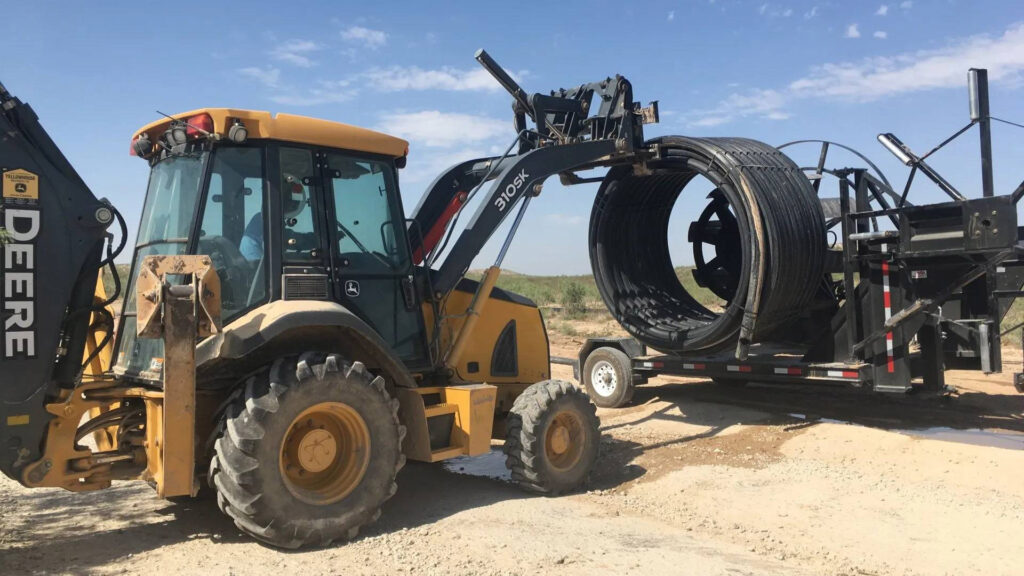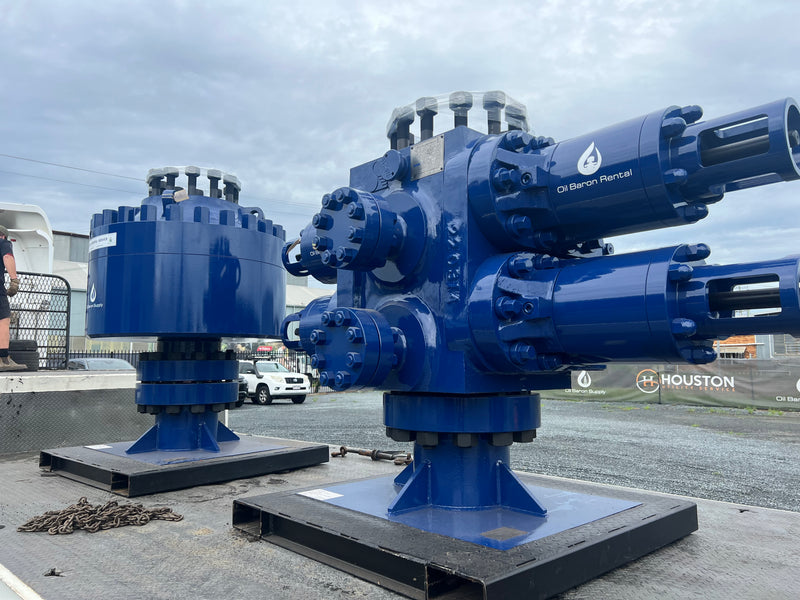A Comprehensive Guide to the Different Sorts Of Oil Field Equipment and Pipeline Equipment Available
The oil and gas industry depends heavily on customized equipment for reliable removal and transport. Various kinds of machinery, from drilling rigs to storage tanks, play essential functions in this complicated procedure. Each item of devices serves distinct functions that add to overall operational success. Recognizing these components is vital for any individual included in the market. As the market develops, so as well do the innovations that support it. What improvements are on the horizon?

Drilling Rigs: The Backbone of Oil Exploration
Drilling rigs function as the essential equipment in the domain of oil exploration, allowing firms to accessibility hydrocarbon reserves hidden deep beneath the Planet's surface. These rigs can be found in various kinds, consisting of land rigs, offshore rigs, and mobile units, each developed to run in specific environments. Furnished with advanced technology, piercing rigs can permeate geological developments with precision, making certain efficient resource removal. The structural stability and functional capabilities of these rigs are essential, as they need to withstand extreme conditions and substantial stress. Furthermore, the option of an exploration rig impacts the total project price and timeline, making it an important consideration for oil business looking for to maximize their exploration efforts and make the most of performance in their procedures.
Pumps: Necessary for Fluid Activity
In the oil removal process, the function of pumps is significant, assisting in the motion of fluids throughout various phases of production. Pumps are necessary for carrying crude oil, water, and other fluids from below ground storage tanks to the surface and after that through pipelines to refineries. They come in numerous kinds, including centrifugal, positive variation, and submersible pumps, each offering certain purposes based upon the fluid features and operational requirements. Centrifugal pumps are generally utilized for their efficiency in high-flow applications, while favorable displacement pumps master managing viscous liquids. The choice of pump influences general performance, functional safety, and upkeep expenses. Proper option and maintenance of pumps are important for optimizing manufacturing and decreasing downtime in oil field operations.
Shutoffs: Managing Flow and Pressure

Shutoffs play an important duty in managing the flow and stress of fluids within oil areas and pipelines. Numerous kinds of valves offer distinctive applications, each designed to meet particular features basic for effective procedure - Superior Oilfield Rentals oilfield. Comprehending the attributes and uses of these shutoffs is important for optimizing system efficiency and security
Kinds of Valves
Vital elements in oil field operations, valves play a vital duty in regulating the circulation and pressure of liquids within pipelines and devices. Various kinds of shutoffs are made use of to satisfy the diverse demands of oil and gas manufacturing. Typical types include gateway valves, which supply a straight-line circulation and minimal stress decrease; globe shutoffs, recognized for their strangling capacities; and sphere valves, recognized for their fast on/off control. Furthermore, check shutoffs stop backflow, while butterfly valves supply a light-weight remedy for managing circulation. Each shutoff type is developed with particular materials and setups to stand up to the extreme problems often located in oil fields, making certain dependability and performance in procedures. Recognizing these types is essential for efficient system administration.
Valve Applications and Functions
While various kinds of valves offer unique purposes, their main applications revolve around regulating flow and pressure within oil and gas systems. Valves such as gate, globe, read more and ball valves regulate fluid activity, guaranteeing peak performance and security. Gate valves are typically made use of for on/off control, providing very little flow resistance. Globe valves, on the various other hand, deal accurate circulation regulation, making them appropriate for strangling applications. Ball valves are preferred for their fast operation and limited sealing capacities. In addition, stress relief shutoffs are important for avoiding system overpressure, protecting tools honesty. In general, the ideal selection and application of valves improve functional efficiency, guaranteeing the trusted transport of oil and gas with pipes and handling facilities.
Compressors: Enhancing Gas Transportation
Compressors play an essential duty in the efficient transport of natural gas, making sure that it relocates smoothly through pipelines over fars away. These gadgets boost the pressure of gas, enabling it to get over rubbing and altitude changes within the pipeline system. Additionally, compressors promote the harmonizing of supply and demand, accommodating fluctuations in consumption and manufacturing rates. Various kinds of compressors are utilized in the industry, consisting of centrifugal, reciprocating, and rotating screw compressors, each offering distinct advantages based on the operational requirements. Regular maintenance of these compressors is important to make best use of efficiency and reduce downtime, ultimately adding to a dependable gas transport network. Their essential function underscores the significance of compressors in the general oil and gas facilities.
Storage Tanks: Safe and Effective Liquid Management
Effective transport of all-natural gas counts on numerous sustaining systems, among which is the appropriate administration of tank. These storage tanks play a necessary duty in safely having liquids, making sure that functional performance is maintained while minimizing ecological dangers. Constructed from sturdy products, they are developed to withstand high stress and corrosive aspects. Appropriately sized and strategically situated, tank facilitate the smooth flow of gas and other liquids, avoiding traffic jams in supply chains. Regular maintenance and surveillance are imperative to detect leaks or structural issues, advertising security and compliance with regulative requirements. Inevitably, the effective monitoring of tank is crucial for the overall stability and integrity of the oil and gas industry's fluid handling systems.
Pipeline Solutions: Framework for Transportation
Pipeline systems act as the foundation of the oil and gas industry, assisting in the efficient transportation of hydrocarbons over large ranges. These systems include various elements, including pipelines, valves, pumps, and compressors, all diligently designed to guarantee seamless flow. The materials utilized in pipeline building, typically steel or high-density polyethylene, are picked for resilience and resistance to rust. Pipeline networks can span across land and water, connecting production sites to refineries and distribution. Additionally, advanced innovation makes it possible for real-time surveillance of circulation prices and stress degrees, boosting functional performance. The strategic placement of these pipelines reduces ecological impact while optimizing source access, therefore playing an essential duty in conference energy demands around the world.
Safety And Security Equipment: Making Sure Worker and Environmental Security
The operation of pipeline systems, while vital for energy transport, additionally provides significant safety obstacles for employees and the atmosphere. Safety tools plays a considerable role in mitigating these dangers. Personal safety tools (PPE) such as safety helmets, gloves, and non-slip footwear safeguards employees from physical dangers. Furthermore, gas discovery systems keep track of for leakages, guaranteeing that dangerous materials do not posture a threat to employees or the bordering ecosystem. Emergency shutdown systems are vital for rapidly halting procedures during a crisis, preventing possible catastrophes. Spill containment products, consisting of absorbents and barriers, are basic for decreasing ecological effect. In general, purchasing all-encompassing safety and security devices is vital for preserving functional stability and safeguarding both workers and the setting in the oil and gas field.

Frequently Asked Inquiries
How Do I Pick the Right Oil Field Equipment for My Job?
Picking the right oil area equipment includes assessing task specifications, spending plan restraints, and operational demands. Think about variables such as equipment reliability, compatibility with existing systems, and the distributor's reputation to assure peak performance and security.
What Are the Maintenance Needs for Oil Field Equipment?
Upkeep requirements for oil area equipment consist of routine examinations, lubrication, and prompt repair services. Operators should additionally stick to manufacturer standards, monitor efficiency metrics, and assurance compliance with safety and security guidelines to boost durability and efficiency.

How Can I Make Certain Compliance With Environmental Rules?
To assure conformity with ecological laws, firms must conduct normal audits, implement best techniques, buy training, keep correct paperwork, and stay updated on legislation (Superior Rentals reviews). Partnership with environmental agencies can additionally improve adherence to guidelines
What Is the Typical Lifespan of Pipeline Equipment?
The ordinary life-span of pipeline devices normally ranges from 20 to 50 years, depending on variables such as material quality, ecological conditions, and maintenance techniques. Normal assessments can significantly influence long life and functional performance.
Exactly how Do I Safely Deliver Oil Field Equipment to Remote Locations?
Transporting oil field devices to remote places needs mindful preparation, consisting of course analysis, safeguarding licenses, making use of proper automobiles, and ensuring safety and security procedures are adhered to. Appropriate training and interaction amongst crews are essential for effective transportation.